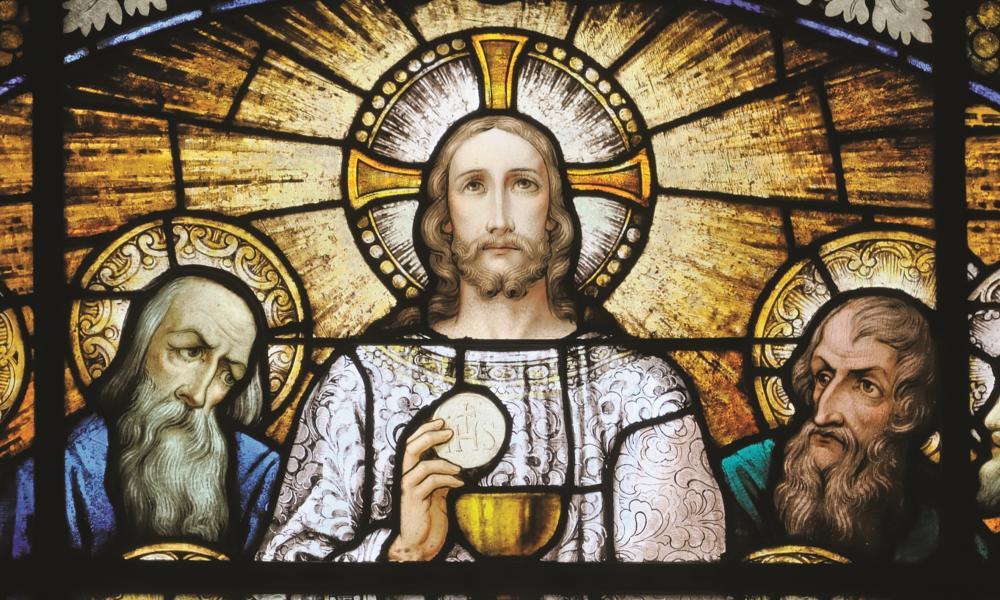
Is Christ really and truly present in the Eucharist?
Dear Father Joe: I’ve read a lot of talk online that, according to a recent study, most Catholics don’t understand Church teaching about the Eucharist or don’t believe in it. People seem very sad and angry about this and as I read all the comments, I wondered if I believe the right thing. Please help, I want to be a good Catholic.
God bless you! Your email was like many I have received in the past few days and, this concern is so common that we decided to jump a few topics and get after this as soon as we could. So, we’ll start right off by looking at the poll, what it revealed, and then what we, as Catholics, believe about the Eucharist.
First, what did the poll reveal?
Thirty-one percent of Catholics interviewed stated that they believe the Church’s teaching about transubstantiation, 69 percent stated that they “believe the bread and wine are only symbols.”
Now, take that 69 percent who stated they believe the bread and wine are only symbols, and you find that 43 percent of them believe that this is what the Church teaches.
What does this tell us? In my opinion, it reveals not so much a willful disagreement with the Church on a core doctrine as a misunderstanding of what the Church teaches.
So let’s look at a quick summary of transubstantiation, the Church’s explanation for the bread and wine actually becoming the reality of the body and blood of Christ. I’m going to try to explain simply some fairly complex theological and philosophical truths using an analogy, so stick with me on this.
We start with the idea of you, a human. Every human being – every person – has elements to him or her that are visible and some that are invisible. The visible part of you, and me, is an external reality we share with everyone we meet. Most humans follow the basic human form: we physically look like humans and share more visible traits than we don’t.
The invisible parts are more of an “internal reality.” We commonly describe this as our soul, or spirit, or nature, or heart. (Just to name a few, and these are not theological terms!) This is a way of saying that we are completely unique in many ways. We all have strengths and weaknesses, we are varying levels of patient or happy or smart – all these sort of “internal” traits that make us unique are from the invisible part of us. They are what we might call our substance.
What is true of you, is also true of other things: there is an element that is visible to the world and a core element of it that is not visible.
Now, let’s go back to the Last Supper that Jesus shared with his disciples. What we believe is that, at the sacred moment, Jesus took the bread and changed its substance. The outside of it (form) stayed the same, but the wheat and water that made it bread (substance) was changed into Christ’s very body.
This is what transubstantiation is: “transforming the substance.” Jesus did the same thing with the wine, too, as it became his blood. We believe that, at every Mass we pray, we join in Christ's eternal sacrifice. And as we re-present the sacrifice, the priest becomes in persona Christi (in the person of Christ), and the substance of the bread and wine is transformed from bread into the very flesh and blood of Christ. And not just his body and blood, but every aspect of who Christ is: his body, blood, soul and divinity are fully present in each element of the Eucharist.
Why did he do this? For a lot of reasons, but as he showed us in the Incarnation, it is all part of the way his love works – he enters every element of our experience and transforms it. Christ took something our bodies need (food) and transformed it into something our souls need – him!
In this, Christ literally enters us in a way that feeds both parts of the human experience – the body and the soul.
This is a miracle of love, and I think that part of the reason some Catholics say they don’t believe it is not because they were never taught it, but because it is so unbelievably miraculous and shocking that they just assume they were taught wrong.
I did a very small, unscientific poll with random parishioners throughout the week. I asked them about transubstantiation and it was definitely a word they struggled with. However, as the conversation continued, I asked them what happens to the bread and wine we offer at Mass and every person I asked but one said that it becomes the body and blood of Christ.
I share this to help us put things in context. I think at least some of the confusion is that our Church language is confusing in today’s world. We use different words differently in the Roman Catholic Church and, frankly, it’s often that misunderstanding that is reflected in such polls.
The key is this: the Eucharist should transform us, and it takes more than proper theology for that transformation to occur in us. Our pride, anger, stubbornness can work against the miracle that Jesus gives us. We need to approach the Eucharist with great reverence, devotion and love and let that change how we see and treat everyone we encounter.
Enjoy another day in God’s presence.
Want more information? Find it in the Catechism of the Catholic Church and re-read John 6:35-58.



